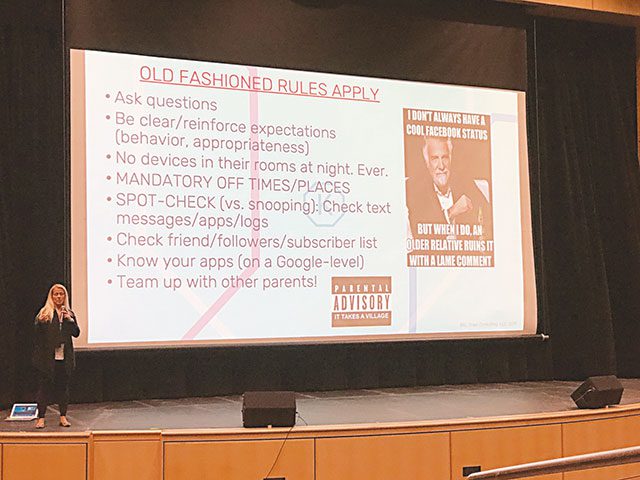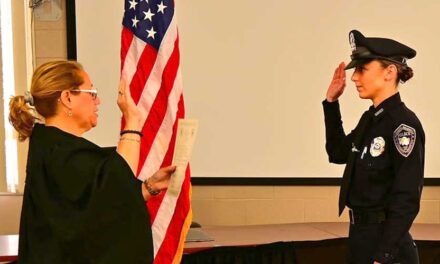Published February 20, 2020

INTERNET SAFETY expert Katie Greer (at left) recommends parents apply “old-fashioned rules” for kids of all ages to keep them safe on their phones and when surfing the internet. Priorities should include never allowing the devices in their bedrooms at night, spot checks, mandatory times when devices must be turned off, keeping up with the apps, setting clear expectations, teaming up with other parents and checking their children’s lists of friends, followers and subscribers. (Debbie Sharp Photo)
By MICHAEL GEOFFRION SCANNELL
NORTH READING — Facing a very excited room full of Batchelder Elementary School students, internet safety expert Katie Greer came prepared. After all, she has been at this for 15 years and this was the fifth gathering she had presided over in North Reading since the previous night This assembly was geared toward the youngest audience members during her whirlwind tour of the town – third-, fourth- and fifth-graders.
Greer had come to speak to them on the use cell phones, the internet, and social media. Staying quiet so everyone could hear and participate, and raising their hands when answering her questions may have been the hardest part for these 8- to 11-year-olds. It was surprising how many raised students their hands when Greer asked if they had their own smartphones. Then she asked what apps they were using. The children were very surprised when Greer announced that the Terms of Use for all of these popular apps require the users to be at least 13 years old to have an account.
Then she asked them, “Who made that rule?” Several hands shot up into the air. The young girl she picked said in a rather quiet voice, “the government.”
It was confirmed that yes, in fact, it is a violation of federal law for children to have an account on these apps if they’re younger than 13 years old, but Greer’s next revelation was downright scary.
“If someone is mean to you or said a bad thing about you on these sites, you have no protection,” Greer explained to the children. She emphasized to the youngsters that the first question the companies that run the apps would ask is “How old was this person?” If the answer is younger than 13, they can answer: “We can’t help you.”
Greer’s visit to the Batchelder School occurred on Wednesday afternoon, February 12, near the end of the school day. She had started her work the evening before in the Performing Arts Center at North Reading High School with a presentation for parents and other interested adults, outlining what she was going to teach the kids and giving them pointers on what they should be doing at home.
Three other sessions were held earlier on Wednesday. The first assembly was attended by freshmen and sophomores, followed by an assembly for juniors and seniors. Greer then met with middle schoolers in the PAC before taking the brief walk over to the Batchelder.
All of this was arranged and co-sponsored with enrichment funds from the North Reading High School Parents’ Association, the Middle School Parents’ Association and the Batchelder Parents’ Organization.
Although the presentations varied depending upon the audience, each covered some basic material such as who is it appropriate to “friend” on social media and how posts and even identities can be shared or stolen online. She spoke to them about their “electronic footprint” and how topics they post today can affect their futures.
This was done all while extolling the virtues and possibilities of technology.
“All the programs were entirely different, based on the age-appropriate developmental needs and topics,” Greer said after the presentations. She explained that she generally asks the questions of younger students. “So with little kids, it’s really hard to get focused questions. I did open it up for middle school and high school questions, and we had some great ones like “How do you think technology will continue to change in our lives, for better or worse?”
Greer does not directly answer the question of what kind of access she thinks kids need, or should, have or at what age. “I think there’s no one-size-fits-all answer. I do think that both at home and at school – at all ages – we need to make sure we’re always stressing and working on balance,” she stated.
“The kids were awesome, had great questions and were very attentive, which I appreciate so much,” she added.
“Katie Greer is knowledgeable and an expert on internet safety. She knows how to adjust the content to her audience,” commented Debbie Sharp, a mom as well as an educational consultant with Who’s Learning Now and the Enrichment Coordinator for the BPO.
She attended the parent session as well as the session at the Batchelder School. “Katie shared ways to keep children safe. As parents, we should be teaching that if we do not know the person in real life, they are not our friends on social media,” Sharp believes. She also feels it is important “to remind our children about their digital footprints. Lastly, technology can get used to make the world a better place.”
Lori Giacalone, co-president of the NRHS Parents’ Association, believes Greer’s message was well received by all of the high school students.
“The 11th and 12th graders were especially interested in finding out that there are many ways their information can be hacked or shared,” Giacalone said, adding she thought this presentation “also made them realize that colleges and employers will research social media before either considering their applications into college or hiring them for a specific job. The things that you post can be used against you.”
As principal of North Reading High School, Anthony Loprete has to be concerned with the internet. He said there is certainly a degree of vigilance that comes with educating students around digital safety but, needless to say, technology is ever-changing.
“It is important to note that one of the themes of Miss Greer’s message is that so much of social media can be used in a positive way. At the high school, our goal is for students to be knowledgeable, responsible, and sensible as they interact with technology in their role as a digital citizen.”
“For me, the biggest thing is thoughtfulness and conversation around how we can all use these amazing technologies as tools for us, not be consumed by these tools,” Greer said. “It’s all about balance and being involved to make sure we can help our kids have a positive and productive experience with social media and technology.”
More information on this topic can be found on Greer’s website (www.klgreer.com) or email her at: Katie@klgreer.com.




